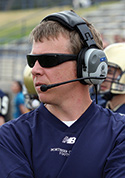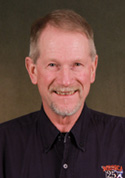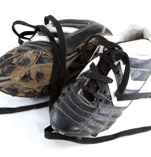 Jon Boyer (right) may be too hard on himself when assessing his playing career, but he’s able to laugh now at the shortcomings that he says are a big reason why he decided to coach.
Jon Boyer (right) may be too hard on himself when assessing his playing career, but he’s able to laugh now at the shortcomings that he says are a big reason why he decided to coach.
“I didn’t necessarily achieve what I wanted to do as a player,” says the Bears’ starting quarterback (2000-01) and former Arena League pro, “so I had a lot to share as a coach to help others achieve their goals.”
Boyer, who studied pedagogy and coaching in graduate school under Associate Professor Mark Smith’s guidance, is one of a number of UNC’s graduates who have gone on to successful coaching careers.
It’s expected that the number of coaching positions, both voluntary and paid, will double in the next 10 years. That’s a big reason why UNC last spring added an online coaching graduate program, one of a few in the country.
Though Boyer went the more traditional route, taking the classes in person, they helped him shape his philosophy as UNC’s offensive coordinator. Boyer thinks a more cooperative approach must be formed with today’s players. Coaching through fear still works, he says, but only to a degree, and Boyer believes in a balance.
“You have to speak to the heart of your players,” Boyer says. “The youth have evolved. The program helps you understand that.”
That’s how Associate Professor Smith coaches his club rugby team at UNC. His team won a national title in 2005 and was runner-up in 2006, and he continues to have success. The team finished 10-2 last year and went undefeated in the Eastern Rockies conference. Smith, like Boyer, wants to get to know his players before he coaches them.
“I need to find out what makes them tick,” Smith says. “Then I know when I either need to scream at them or back off on them.”
Teaching other prospective coaches how to succeed is a big reason why Smith manages UNC’s online coaching program. This spring, students from Kansas to Canada were enrolled. The program teaches 40 standards over eight domains, and though the program is complex, it attempts to prove what many successful coaches believe, including those who use a more modern approach such as Smith and Boyer: Coaching is coaching, regardless of the sport.
For Smith, 15 percent of his coaching is actual strategy specific to rugby. The rest, he says, is psychology, motivation and simply knowing how to get the most from his players. That’s not nearly as intuitive as you might think: Many coaches, in fact, have to learn those skills. Boyer, who recommends UNC’s graduate coaching program “on a daily basis,” learned those skills from UNC, not from being a quarterback.
“We’ve got a lot of people who started taking exercise science but really wanted to get into the sport aspect of it, and universities aren’t providing that,” Smith says. “This is science based. It has a set of standards. But it teaches everything a coach has to come up with.”
Gaining coaching experience is still paramount, says Irv Brown, a successful high school coach, head baseball coach at the University of Colorado and an assistant football coach who also officiated a halfdozen basketball Final Fours. He is a member of the Colorado Sports Hall of Fame and is now a well-known broadcaster.
“I don’t know if you learn to coach when you’re in college,” Brown says. “You do get theory. But it’s the actual doing it, and you learn a lot from the guys you’re playing. The best way to learn is to watch and coach.”
Sometimes, he says, only half-jokingly, that got him in trouble as an official because he would watch Coach John Wooden and his dominant UCLA teams more than calling the game.
Brown’s philosophy, and what he considers to be most important, are similar to what’s being taught at UNC.
“I always felt like the most important thing you can do is get the most out of the kids,” Brown says. “If you get the best players, that helps, but then you don’t screw them up. It’s how you handle people.”
 Bill Seamon (right) learned the same lesson from UNC in 1977, when he graduated with a degree in Physical Education, Health and Recreation. One that stuck with him came from his statistics teacher. He was struggling and asked for help.
Bill Seamon (right) learned the same lesson from UNC in 1977, when he graduated with a degree in Physical Education, Health and Recreation. One that stuck with him came from his statistics teacher. He was struggling and asked for help.
“He stayed with me for an hour and a half until the light came on,” Seamon says. “The longer I coached, I realized it’s important to never leave a student not understanding the lesson.”
Seamon wrote a book that was released last year after a long career as a high school baseball coach and induction into the National High School Baseball Coaches Association Hall of Fame. Baseball coaches talk about five-tool players as the best, and he based most of his book on the five tools he believes any coach needs to be successful. They should be a leader, a teacher, a communicator, a counselor and a motivator. Those five qualities, as others have said, are more important than any strategy or skill.
“There’s an old saying that a sport is 90 percent mental and 10 percent skills,” Seamon says. “I’d probably use the same saying and say 90 percent of coaching is based on those five character traits.”
More universities are requiring their head coaches to have graduate degrees, and as it turns out, more assistants should have them, too.
Brett Nichols, who worked as an assistant basketball coach and the head golf coach at Oberlin College in Ohio, is at UNC to get his doctorate in Social Psychology of Sport and Physical Activity, another niche program at UNC.
Nichols played Division III basketball and ran track, and while impressive, it didn’t give him the connections he says would help him land a job as a head basketball coach at the top college level.
“I’ve applied for a lot of jobs, and there’s 150 applicants on those piles,” Nichols says. “I looked pretty average on that pile, I think. In this case, now, I may be the only one with a doctorate.”
Nichols says the courses are helping him approach coaching from an academic side. Some successful coaches do seem to know what works, but the courses teach him tactics and approaches that are backed by solid research. These are proven techniques, he says, not trial and error.
Others are using the new online master’s program as a way to get their credentials and prepare for a world of expanding opportunities. Hannah Stolba coaches UNC’s women’s rugby team, which is a club sport for now. If it ever becomes a university sport, Stolba wants to be ready for it. She could just draw on her experience as a player on the USA World Cup team. But many former players try to transition into coaching, and many others may have a master’s degree but not in coaching.
“I feel like it will give me an advantage that a lot of rugby coaches don’t have,” she says.
The online part was perfect for Stolba, who travels to other countries quite a bit with the U.S. rugby team. She also holds down a job in Denver.
“I was only home one week from mid-August to mid-December,” she says. “It was a challenge, and it will continue to be a challenge.”
Boyer, like Stolba, is grateful he didn’t just rely on his experience as a quarterback to get him a coaching job. Today that doesn’t work. Once Boyer did get his degree, it seemed to pay off right away: He got a job as an offensive coordinator for Mesa State (now Colorado Mesa). He started coaching at UNC in 2011 and became offensive coordinator last year.
“It’s been a whirlwind ever since I got my degree,” Boyer says. He laughs again. But this time, it’s the laugh of someone who seems to be satisfied with the way his life turned out. NV






